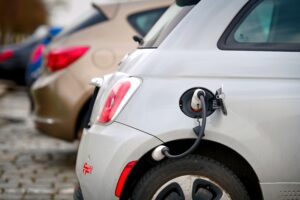
Transport & Environment’s research results suggest that smaller cars could reduce the requirement for raw materials such as lithium, manganese, cobalt and nickel by almost a quarter.
Smaller cars could ease the demand for battery materials such as cobalt, lithium, nickel and manganese by almost a quarter, according to the Transport & Environment think tank
A green transport organization has alerted that the trend for cars with greater weight is boosting the call for metals required in electric car batteries.
Transport & Environment, a thinktank, has suggested that a reduction in the size of cars could reduce the predicted requirement for battery resources, such as cobalt, lithium, nickel and manganese, by up to a fourth. They are advocating for the UK government to impose a taxation system based on weight for the heaviest cars and the largest models, as well as introducing tax incentives for small electric vehicles.
The UK saw a 44 percent surge in sales of sports utility vehicles among electric vehicles in 2020. Generally, the heavier the car, the greater the battery size for it to have the same range. To prevent further growth in this direction, it is necessary to put a stop to this trend.
Read more:
Think tank says tax cars based on their weight





